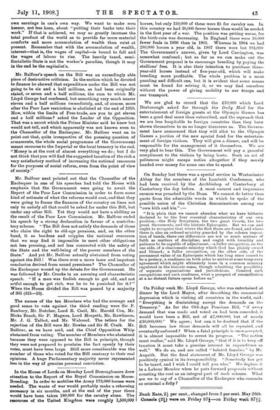Mr. Balfour next pointed out that the Chancellor of the
Exchequer in one of his speeches had told the House with emphasis that the Government were going to await the Report of the Poor Law Commission in order to form some kind of estimate of what the reforms would cost, and that they were going to frame the finances of the country on lines not only to satisfy all that could be asked for under this Bill, but under any other Bill. Yet they would not have a shilling as the result of the Poor Law Commission. Mr. Balfour ended his speech by a strong declaration in favour of a contribu- tory scheme. "The Bill does not satisfy the demands of those who claim the right to old-age pensions, and, on the other hand, it so burdens and cripples the national resources that we may find it impossible to meet other obligations not less pressing, and not less connected with the safety of the State and the well-being of the poorer members of the State." And yet Mr. Balfour actually abstained from voting against the Bill ! Was there ever a more lame and impotent conclusion derived from sound premisses ? The Chancellor of the Exchequer wound up the debate for the Government. He was followed by Mr. Crooks in an amusing and characteristic speech. "If a man was foolish enough to get old, and not artful enough to get rich, was he to be punished for it ? " When the Rouse divided the Bill was passed by a majority of 305 (315-10).






































 Previous page
Previous page